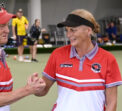Who’s responsible?
Throughout the past season I have observed and been informed of situations where bowlers and or spectators have behaved in ways that are unacceptable, where responsibilities that come with a role have been either ignored or not exercised. Overall, the game is in good shape but there have been too many disturbing events that do not show our great sport as the great spectacle it is. It can be a matter of the manner in which someone speaks to a fellow club member to major events that have resulted in significant suspensions at Club, State and National level.
Is there something we can ALL do in our respective roles to perhaps limit impact or diffuse these incidents? I believe so.
Some recent examples:
- A player reprimanded (berated) an opposition player for updating the scoreboard, where they were abruptly told “That’s not your job”. Domestic Regulation (DR) 3.1 states clearly the scoreboard may be updated at any time by any person. Even if the opposition player had made an error it is the way we speak to each other that is of paramount importance.
- Umpires demanding that players stand on the bank while they measure for shot. While the umpire is entitled to have space to not feel threatened or not be impeded in their role, there is no such law.
- Interruptions v Stoppages. When a stoppage occurs, the managers and umpires should get together and agree whether it is an interruption or a stoppage. The umpire then can confirm if it is an interruption (Law 33) or stoppage, (Law 32.2). This should avoid issues around continuing ends or declaring the last end dead. If the side managers cannot agree the umpire must make the decision.
- A serious scenario where a player or players during a pennant game are using totally inappropriate language and have eventually come into physical contact with each other.
- When something happens, for whatever reason the Umpire of the day does not act or is so intimidated by what is occurring that they choose not to intervene.
Who is responsible for managing this? My experiences suggest that the most hostile of situations will diffuse relatively quickly if the Umpire of the day, the side managers and the skips intervene and call the behaviour for what it is – totally unacceptable. This is the time when we ALL need to step up. Side managers need to take charge of their troops, skips need to simply step up to diffuse. Club leaders need to show leadership.
This is the crucial time when people’s roles become an integral part in ensuring things do not escalate.
There are many roles played out within a bowls club, within a game of bowls and amongst the many social interactions that occur in and outside the club house. Many roles come with rights and rights come with responsibilities. What are you responsible for?
There are the Laws of the Sport, controlling bodies, conditions of play, club constitutions, regulations, schedules, planning documents, committee meetings, codes of conduct and individual behaviors which should all interact and interweave to provide an environment for competitive games, good company and a happy space.
Roles within a club will include the Coach, the Umpire, the Side Manager, the Players, the Skip, the President, the Selectors, the Committee, the many volunteers, the passionate supporters and the Greens Director.
Each plays an integral part in making a club successful and hopefully nurturing an environment where all club members feel valued, respected, happy and safe.
Key Roles on Game Day:
- Controlling Bodies – at various levels controlling bodies set regulations, and may be called upon to invoke disciplinary procedures for serious incidents;
- Club Officials – are responsible for the overall running of the club, and will be aware of national and State policies club constitutions, club by-laws and other requirements such as venue licensing and the club’s policy on smoking. The president or nominated representative on the day should be ready to play their part should an incident occur where they can provide leadership in resolving the issue;
- Greens Director – responsibility to make all managers aware of who the greens director is should a decision on continuing or suspending play based on the condition of the green(s) be required;
- Umpires – the umpire(s) or measurers of the day should be nominated and made known to all managers and players. The duties of an umpire are clearly set out in Law 43.2, where Law 43.2.5 states the umpire must make sure that all aspects of play are in line with the Laws of the Sport. Remembering the umpire’s decision is final in all circumstances except those relating to the meaning or interpretation of a law, Law 43.2.6.
- Managers – managers are responsible for their respective teams. As well as looking after the administrative parts of a game, they should be leaders who can effectively manage their team with skips and players should an incident escalate;
- Coach – The role of the Coach is covered by Law 44. The important aspects include the umpires being informed of the names of the coach or their delegate at an before the game starts Law 44.1. Any advice given can only occur when their team or side is in possession of the rink Law 44.3 and the person giving the advice must do so from outside the boundaries of the green, Law 44.4.
- Spectators (Law 45)– Spectators and anyone else not directly taking part in the game must stay outside the boundaries of the green and not disturb or advise the players in any way. Under Law 45.4, the umpire can take action should spectators act in contravention of this law. If the spectators do not respond to the Umpire’s requests, the controlling body needs to be informed so they can take action and manage the concerning behaviour.
All officials should have an inclusive approach and style. Officials need to be able to relate to all participants regardless of age, ability, and degrees of involvement in the game. This would include spectators, other officials and organising bodies. (Page 71, BA Officiating Manual. 2019.)Many incidents occur because players simply do not know the laws of the sport, or persons claim to know but in fact often confuse etiquette (or “That’s what we have always done”.) with correct procedure and processes.
The Laws of the Sport refer to defaulting players, teams, and sides (C2) as not meeting the requirements of any specific law or laws. C10 refers to forfeiting a game to an opponent as a penalty for the defaulting player, team or side not following the laws.
Basically, going outside the laws of the sport can result in a forfeit. What can the umpire do?
If there is a disturbance umpires need to take the players aside for discuss the situation thus eliminating the small number of other players who often want to become involved:
- Umpires need to ensure they speak to players in a calm and respectful manner remembering that the best umpires are authoritative and not authoritarian. The best umpires diffuse and not inflame. Interpersonal skills are crucial.
- Sometimes players (and or side mangers) just need one warning particularly regarding offensive language, smoking, or using mobile phones on the greens. In a tight moment of the game where everyone is keen and tense it is not difficult to express disappointment using an unacceptable expletive. Sometimes in the vagueness of the moment people just forget. A gentle reminder is usually enough. Repeat the same offence and an instantaneous penalty should be applied, as set out in the Conditions of Play for Metropolitan and Region/Division Pennant.
Instantaneous Penalty:
- If the umpire of the day by their own observation or on appeal by the Controlling Body, a Side Manager, a Skip or an opponent decides that a player is non-compliant then the end shall be immediately regarded as completed and the opponent of the offender shall be awarded as many shots as there are bowls in use by the opponents.
- On the second offence by the same player in the same game, the player shall be excluded from taking any further part in the game. No replacement player or substitute would be allowed in his/her team. In a team game the defaulting team will forfeit the game to their opponent. Game over!
All umpires need to know is that they can invoke the Instantaneous Penalties Policy and would have the full backing of Bowls Victoria and Bowls Australia in doing so. If Umpires invoke the instantaneous penalty, they need to inform BV in writing what occurred. BV have a set of disciplinary guidelines which involves the formation of a committee to deal with allegations and when appropriate issue penalties.
Serious offences may also be subjected to police action – a decision that should be made in consultation with the venue manager and the controlling body. Any individuals can report matters to the police as they see fit.
If the appointed umpire of the day takes no action, what next? Can other accredited umpires (not appointed) who are present do anything? Could the President (or their nominee) of the club do anything here? Should the player’s team members say something? The answer is simply YES. If you have the skills be proactive. This is the time when we ask people to step up and show leadership. Behaviour unchallenged remains unchanged. Prompt action could result in less impact to the game, and ultimately reduce possible disciplinary penalties or even a game forfeiture.
Take your designated role carefully as you may be held accountable for your lack of action.
In most sporting environments the potential for conflict can be present. What is important is how we diffuse potential escalating situations. Effective communication is essential in managing any situation, particularly escalating conflict.
Listening, interpreting, and responding appropriately is crucial. What is important is to act quickly, be fair and consistent, be definite and firm, keep cool, do not take things personally and give instructions in the form of choices or options. (Page 76, BA Officiating Manual, May 2019).
In what ever role you have at your club think about how you go about your involvement. Be respectful of each other and enjoy our great game. If conflict arises it is important to attempt to resolve it promptly without fear or favour. Follow the processes in place, know your own skills sets, understand your club’s expectations around behaviour and wear your club shirt with pride.
Enjoy our great game, hopefully sooner rather than later.
John Roberts,
Chair, Officiating and Laws Committee.
April 2020
Are you interested in becoming an umpire, or updating your accreditation? Please visit our Workforce page here.




